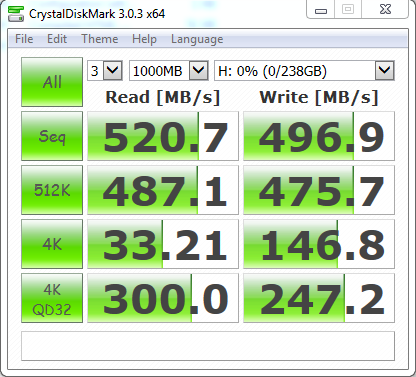CRYSTAL DISK BENCHMARK VER. 3.0 X64
Crystal Disk Benchmark is used to measure read and write performance through sampling of random data which is, for the most part, incompressible. Performance is virtually identical, regardless of data sample so we have included only that using random data samples.
Crystal Disk Mark shows us the drive was able to hit 520.7MB/s read and 496.9MB/s write. The drive’s 4K reads come in at 33.21MB/s and 146.8MB/s for the 4K writes.
The toughest benchmark available for solid state drives is AS SSD as it relies solely on incompressible data samples when testing performance. For the most part, AS SSD tests can be considered the ‘worst case scenario’ in obtaining data transfer speeds and many enthusiasts like AS SSD for their needs. Transfer speeds are displayed on the left with IOPS results on the right.
In AS SSD it hit an overall score of 1192, just the exact same total score the M.2 drive was able to achieve. Sequential speeds hit 522.17MB/s for reads and 454.53MB/s write. 4K speeds reach 34.08MB/s for read and 133.44MB/s for write. Furthermore, the drive reached 94,858 read IOPS and 80,561 write IOPS.
To complement this, the AS SSD Copy Bench presents us with transfer speeds for different file types. The M.2 M600 reached a high of 451.37.91MB/s for the Game test.

ANVIL STORAGE UTILITIES PROFESSIONAL
Anvil’s Storage Utilities (ASU) are the most complete test bed available for the solid state drive today. The benchmark displays test results for, not only throughput but also, IOPS and Disk Access Times. Not only does it have a preset SSD benchmark, but also, it has included such things as endurance testing and threaded I/O read, write and mixed tests, all of which are very simple to understand and use in our benchmark testing.
In Anvil Storage Utilities the max sequential read reaches 520.99MB/s (exactly the same as the M.2 variant) and max sequential write is just shy of the rates specification, coming in at 472.11MB/s. When looking at 4K speeds, it was able to reach33.37MB/s for read and 136.43MB/s for write.
 The SSD Review The Worlds Dedicated SSD Education and Review Resource |
The SSD Review The Worlds Dedicated SSD Education and Review Resource | 

Just checking intro comment “Over the next few years the production of client tablets and notebook PCs will be doubling by OEMs.”
is there is a source for this?
From a graph from Micron: https://i.imgur.com/naC64yw.png